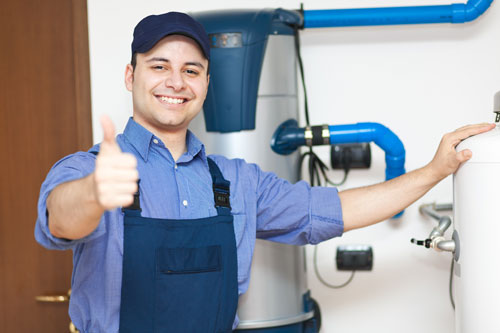Managing Regular Water Heater Issues
Managing Regular Water Heater Issues
Blog Article
We have encountered this article pertaining to Water Heater Repair and Troubleshooting below on the net and reckoned it made good sense to talk about it with you on this page.

Visualize starting your day without your regular warm shower. That already sets a poor tone for the remainder of your day.
Every house requires a trustworthy water heater, yet just a few know how to manage one. One very easy way to keep your hot water heater in top shape is to look for faults regularly as well as repair them as quickly as they show up.
Keep in mind to switch off your water heater prior to sniffing around for faults. These are the water heater faults you are more than likely to run into.
Water also warm or as well cool
Every water heater has a thermostat that determines how hot the water obtains. If the water entering your residence is too warm regardless of establishing a practical maximum temperature, your thermostat may be malfunctioning.
On the other hand, also cold water might be because of a fallen short thermostat, a damaged circuit, or inappropriate gas flow. For example, if you utilize a gas hot water heater with a broken pilot light, you would certainly get cold water, even if the thermostat is in ideal condition. For electric heating systems, a blown fuse might be the offender.
Not enough warm water
Water heaters can be found in lots of sizes, depending on your hot water needs. If you lack hot water before everyone has actually had a bathroom, your water heater is also little for your family size. You need to think about installing a larger water heater container or selecting a tankless water heater, which occupies less space and also is a lot more durable.
Odd sounds
There are at least 5 type of sounds you can speak with a hot water heater, however one of the most usual analysis is that it's time for the hot water heater to retire.
Firstly, you must be familiar with the typical appears a water heater makes. An electric heater may appear different from a gas-powered one.
Popping or banging noises generally imply there is a piece of sediment in your containers, as well as it's time to clean it out. On the other hand, whistling or hissing sounds might simply be your shutoffs allowing some pressure off.
Water leaks
Leakages can originate from pipes, water connections, shutoffs, or in the worst-case scenario, the tank itself. In time, water will corrode the tank, as well as find its escape. If this takes place, you require to change your water heater immediately.
Nonetheless, prior to your change your entire tank, make sure that all pipes remain in area which each valve works perfectly. If you still need aid recognizing a leakage, call your plumber.
Rust-colored water
Rust-colored water implies one of your water heater components is worn away. Maybe the anode rod, or the storage tank itself. Your plumber will be able to determine which it is.
Warm water
Despite exactly how high you set the thermostat, you won't obtain any warm water out of a heating system well past its prime. A water heater's efficiency may minimize with time.
You will also obtain warm water if your pipes have a cross link. This means that when you activate a faucet, hot water from the heater streams in along with normal, cold water. A cross connection is very easy to spot. If your hot water faucets still pursue shutting the hot water heater shutoffs, you have a cross connection.
Discoloured Water
Corrosion is a major cause of dirty or discoloured water. Rust within the water storage tank or a failing anode pole might create this discolouration. The anode rod shields the storage tank from rusting on the within and must be inspected yearly. Without a rod or an appropriately working anode pole, the warm water swiftly wears away inside the storage tank. Get in touch with a specialist water heater specialist to figure out if replacing the anode rod will certainly take care of the trouble; if not, change your water heater.
Conclusion
Ideally, your water heater can last ten years prior to you require a change. However, after the 10-year mark, you might experience any one of these mistakes much more consistently. At this moment, you must include a brand-new water heater to your budget plan.
How To Troubleshoot 3 Common Water Heater Problems in Twin Cities
The Water Heater Is Leaking
A leaky cold water inlet valve A loose pipe fitting A leaky temperature and pressure relief valve A corroded anode rod A cracked tank Turn Off Your Water Heater:
Shut off your gas water heater by turning the gas valve on the unit to the “OFF” position. Shut off your electric water by switching its power off at your electrical panel. Look for a two-pole breaker labeled “water heater” and turn it to the “OFF” position. Move the ball valve connected to the water heater to be perpendicular to the piping at a 90° angle. Look for the Leak:
Depending on whether the water is coming from the tank's top or bottom, you’ll want to look for the leak in different locations.
If the leak comes from the top of the tank, carefully look for water escaping from the cold water inlet valve or loose pipe fittings. Rusted hot and cold water valves can have loose connections with the tank, with water leaking out of them.
https://mspplumbingheatingair.com/blog/how-to-troubleshoot-3-common-water-heater-problems
I stumbled upon that blog entry about Water Heater Repair and Troubleshooting when surfing around the web. In case you liked our page if you please be sure to pass it around. Thanks a bunch for your time. Visit again soon.
Tap issues? Ring! Report this page